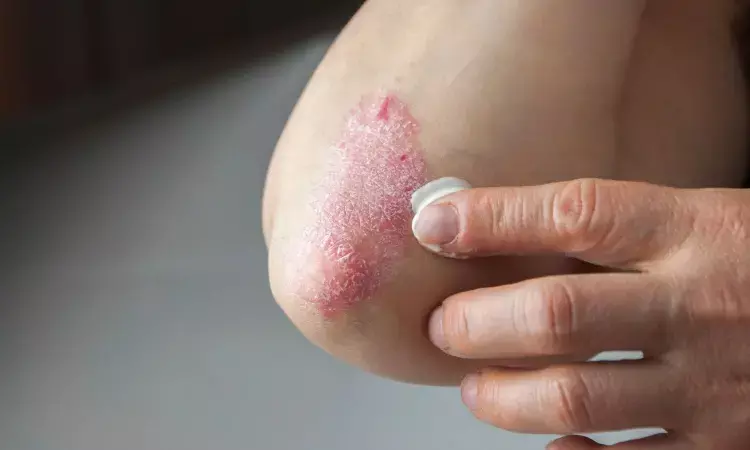- Home
- Medical news & Guidelines
- Anesthesiology
- Cardiology and CTVS
- Critical Care
- Dentistry
- Dermatology
- Diabetes and Endocrinology
- ENT
- Gastroenterology
- Medicine
- Nephrology
- Neurology
- Obstretics-Gynaecology
- Oncology
- Ophthalmology
- Orthopaedics
- Pediatrics-Neonatology
- Psychiatry
- Pulmonology
- Radiology
- Surgery
- Urology
- Laboratory Medicine
- Diet
- Nursing
- Paramedical
- Physiotherapy
- Health news
- Fact Check
- Bone Health Fact Check
- Brain Health Fact Check
- Cancer Related Fact Check
- Child Care Fact Check
- Dental and oral health fact check
- Diabetes and metabolic health fact check
- Diet and Nutrition Fact Check
- Eye and ENT Care Fact Check
- Fitness fact check
- Gut health fact check
- Heart health fact check
- Kidney health fact check
- Medical education fact check
- Men's health fact check
- Respiratory fact check
- Skin and hair care fact check
- Vaccine and Immunization fact check
- Women's health fact check
- AYUSH
- State News
- Andaman and Nicobar Islands
- Andhra Pradesh
- Arunachal Pradesh
- Assam
- Bihar
- Chandigarh
- Chattisgarh
- Dadra and Nagar Haveli
- Daman and Diu
- Delhi
- Goa
- Gujarat
- Haryana
- Himachal Pradesh
- Jammu & Kashmir
- Jharkhand
- Karnataka
- Kerala
- Ladakh
- Lakshadweep
- Madhya Pradesh
- Maharashtra
- Manipur
- Meghalaya
- Mizoram
- Nagaland
- Odisha
- Puducherry
- Punjab
- Rajasthan
- Sikkim
- Tamil Nadu
- Telangana
- Tripura
- Uttar Pradesh
- Uttrakhand
- West Bengal
- Medical Education
- Industry
Systemic inflammation may play role in association between skin disease severity and CVD in psoriasis: JAMA

Sweden: A recent study has shed light on the intricate relationship between psoriasis, systemic inflammation, and cardiovascular disease (CVD), highlighting the interconnected nature of these health issues. Psoriasis, a chronic inflammatory skin condition, has long been recognized for its impact on skin health, but this research underscores its broader implications, particularly concerning cardiovascular risks.
The study, published in JAMA Dermatology, revealed that psoriasis severity, measured by the Psoriasis Area and Severity Index (PASI), was linked to systemic inflammation. Additionally, PASI and systemic inflammation, assessed through GlycA levels, were connected to CVD, with systemic inflammation potentially mediating the relationship between PASI and CVD.
Psoriasis is linked to an elevated risk of cardiovascular disease, though the precise mechanisms driving this connection remain uncertain. Understanding these pathways could aid in developing targeted treatments and provide insight into how peripheral inflammation, like psoriatic skin lesions, contributes to CVD. With this in mind, Axel Svedbom, Dermatology and Venereology Clinic, Karolinska University Hospital, Stockholm, Sweden, and colleagues aimed to investigate whether systemic inflammation mediates the relationship between psoriasis severity and CVD.
For this purpose, the researchers analyzed data from two cohorts: the PACI (2013–2022) in Maryland and the SPC (2000–2005) in Sweden. PACI included patients with prevalent psoriasis referred by dermatologists, while SPC included incident psoriasis cases from various practices. Psoriasis severity was assessed using PASI, and systemic inflammation was measured via GlycA, a glycan biomarker of acute-phase proteins.
Mediation analysis examined associations between PASI, systemic inflammation, and outcomes like noncalcified coronary burden (NCB) and cardiovascular events. Data analysis from October 2023 to January 2024 explored how systemic inflammation might mediate the link between psoriasis severity and cardiovascular risk.
Based on the study, the researchers reported the following findings:
- Of 260 eligible patients in the PACI cohort, 62.3% were male, with a median age of 51.
- Of 509 eligible patients in the SPC cohort, 46.6% were male, with a median age of 43.
- PASI was associated with GlycA levels and cardiovascular disease in both studies.
- GlycA levels were independently associated with CVD.
- The direct effect of PASI on noncalcified coronary burden (NCB) was 0.94.
- The indirect effect of PASI on NCB via GlycA was 0.19.
- The odds ratio for the direct effect of PASI on cardiovascular events was 1.23.
- The odds ratio for the indirect effect of PASI on cardiovascular events via GlycA was 1.16.
"The findings indicate that systemic inflammation, assessed through GlycA levels, may mediate the relationship between psoriasis severity, measured by PASI scores, and cardiovascular disease in individuals with psoriasis. Further research could investigate whether managing skin disease severity helps reduce subclinical atherosclerosis and the risk of cardiovascular events," the researchers concluded.
Reference:
Svedbom A, Mallbris L, González-Cantero Á, et al. Skin Inflammation, Systemic Inflammation, and Cardiovascular Disease in Psoriasis. JAMA Dermatol. Published online November 20, 2024. doi:10.1001/jamadermatol.2024.4433
Dr Kamal Kant Kohli-MBBS, DTCD- a chest specialist with more than 30 years of practice and a flair for writing clinical articles, Dr Kamal Kant Kohli joined Medical Dialogues as a Chief Editor of Medical News. Besides writing articles, as an editor, he proofreads and verifies all the medical content published on Medical Dialogues including those coming from journals, studies,medical conferences,guidelines etc. Email: drkohli@medicaldialogues.in. Contact no. 011-43720751


